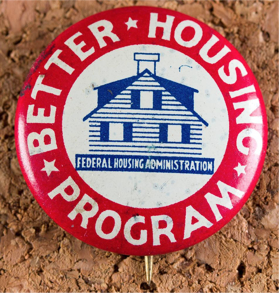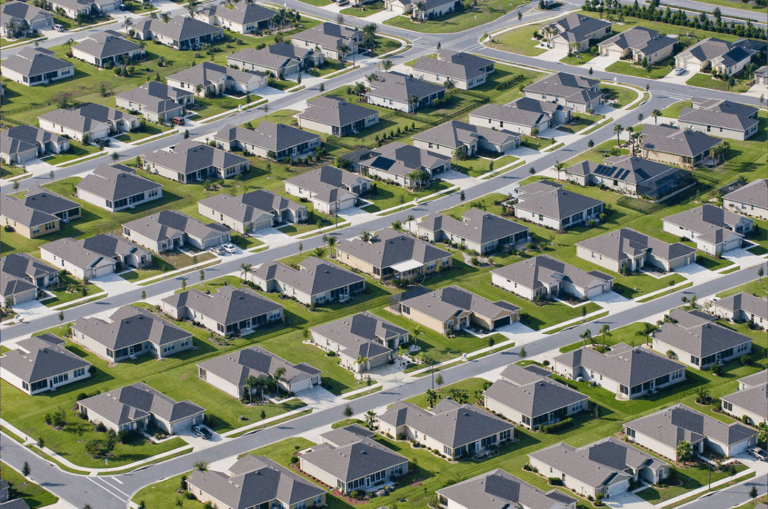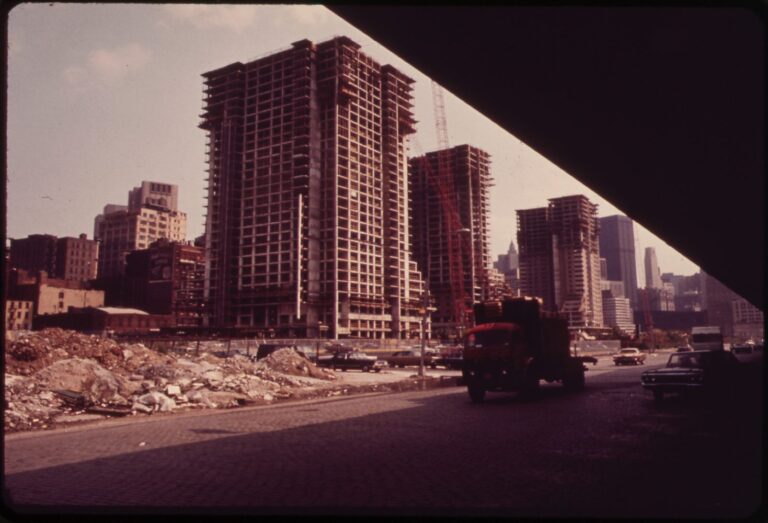Physical Address
304 North Cardinal St.
Dorchester Center, MA 02124
Physical Address
304 North Cardinal St.
Dorchester Center, MA 02124
My last post, on urban geographic constraints and housing prices, led to an interesting discussion thread. The most common counter argument was that because dense cities are usually more expensive, density must cause high cost. But if this was true, cities would become cheaper as they became less dense. Most American urbanized areas have become less dense, not more, over time due to suburban sprawl. Even where city populations have grown, much of that growth has been in areas that where undeveloped a century ago. Thus, the developed part of even growing cities were, I suspect, more dense in 1917 than than they are today: for example, Manhattan’s population peaked at 2.3 million in 1910, about 40 percent more than its current population. So rents should have come down. Did they? Apparently not. The Census date has statewide data showing that rents rose pretty much everywhere in real terms over the late 20th century. In the District of Columbia, real rents increased from $346 to $612 in real dollars between 1950 and 1990, even as the city was losing population and the region was de-densifying. If Washington is typical, it appears that lower density and higher rent went hand-in-hand.

One common argument against building new urban housing is that cities are geographically constrained by their natural and political boundaries, and thus can never build enough housing to bring prices down. This claim rests on a variety of false assumptions. The first false assumption is that the amount of land in a city limits the amount of housing in that city. If you assume that every bit of residential land must be occupied by single-family houses on 1/5 of an acre on land, I suppose this assumption makes sense. But in reality, you can always put more people on a block of land. Where today you have big houses, tomorrow you could have small houses. Where today you have small houses, tomorrow you could have small apartment buildings. Where today you have small apartment buildings, tomorrow you could have large apartment buildings. Even in midtown Manhattan, where I live, there are lots to two-to-four story buildings that could be knocked down and replaced with larger buildings. If Manhattan had the density of Mongkok (a popular Hong Kong neighborhood with 340,000 people per square mile), it could accommodate almost 7 million people- about 80 percent of the city of New York’s population.* And if Manhattan had enough housing to accommodate Mongkok-type densities, a whole lot of housing units (either outer borough units or older Manhattan units) would become vacant, causing rents to plunge. The second assumption is that a city’s built-up core is its entire housing market. But this is wrong, because Manhattan landlords compete not just with each other, but with landlords in the outer boroughs and the suburbs. So if enough housing units were, for example, built in New Jersey, demand for housing in Manhattan would eventually decrease. *A common counteragument is that demolishing and rebuilding housing […]

Our tax code favors suburbia. Homeownership, greenfield development, and sprawl receive preferential tax treatment, and the market responds to incentives built into the code. As a result, a disproportionate amount of capital flows to those investments. In many cases, it has been an unintentional side effect of pursuing other goals. The combined effect is that our tax system plays a huge role in shaping our communities. Its influence is an important factor to understanding how residential design in the US became what it is today.

The government exercises tremendous power over residential design in the US. Its influence is nearly invisible, because it works through complex financing programs, insurance incentives, and secondary markets. These mechanisms go unnoticed, but their effect is hard to miss—they remade the United States into a nation of sprawling suburbs. This is the second post in a series about government policies that encouraged suburban growth in the US. You can find the first post here. What image springs to mind when you picture “federally subsidized housing”? Most people imagine a low-income public housing tower, a homeless shelter, or a shoddy apartment building. Nope—suburban homeowners are the single biggest recipient of housing subsidies. As a result, suburbs dominate housing in the United States. For decades, federal finance regulations incentivized single-family homes through three key mechanisms: Insurance, National mortgage markets, and New standards for debt structuring The housing market hides these details from the typical home buyer. As a result, most people are unaware of these subsidies. But their effects are striking—they determined the location and shape of development across America for generations. A New Deal to restore the housing industry Debt has a negative connotation these days. Credit cards, student loans, and auto loans are the anchors that keep many Americans in debt for most of their life. Meanwhile, we view mortgages very differently—they are seen as an investment, a symbol of adulthood, and a sign of financial stability. This was not always the case. In the early 1900s, mortgages were just like any other kind of debt. Nowadays payments are spread out over decades, but back then they came due all at once after a few years. Most people didn’t have enough cash at the end of the term. It was standard to pay back some and negotiate a new loan for […]
One long-forgotten housing option is residential hotels; a century ago, most renters lived in hotels and shared space with short-term tenants. I just read a book, Living Downtown, about the rise and fall of residential hotels. Rather than discuss them in detail I refer you to my amazon.com review. But here are two general thoughts: one reason Airbnb has been controversial is because it mixes long-term and short-term tenants. But in the first half of the 20th century this was a common mixture. Until the 1920s, residential hotels were so unregulated that they included a wide range of places, from luxury hotels to vile flophouses where there was not even a mattress to sleep on. But this mixture allowed even tramps to avoid sleeping on streets as they do now.

This is the first article of a five-part series on suburbia in the United States. In primary school, one of my friends lived in a duplex. This fact blew my mind. To my inexperienced 7-year-old mind, a duplex barely registered as a house. Her family shared a driveway with their neighbors, and their yard was tiny. It was the first house I’d ever seen that shared a wall with its neighbors. I’d seen apartments of course, but in my mind those were temporary, for people who who were saving up to buy a “real” home. I couldn’t understand that some people might actually prefer to live in something besides a private home, because I’d never come across it before. Median income in American cities tends to rise at about 8 percent per mile as one moves away from the business district. My mental model of the world was pretty typical for an American child brought up in a single-family home. It’s easy to see why—US residential development is dominated by suburbs, and home ownership is touted as the ultimate symbol of prosperity. Other types of dwellings tend to be for young people starting out in life or low income households unable to afford a place of their own. The popular image of the American Dream includes a white picket fence and a car, not an apartment and a subway pass. This is in stark contrast with most other countries. The French word for suburb is banlieue, and it has come to connote poverty and social isolation, because that is where immigrants and the poor tend to live. They’ve been known as “red suburbs” because of their tendency to vote Communist. Meanwhile, the wealthy live in the city center. In South Africa, the inner city is reserved for the privileged white […]
Ever since zoning was invented in the 1920s, homeowners have argued that limits on density and on multifamily housing are necessary to protect property values. But today, urban NIMBYs seek to prevent new housing on the ground that new housing will lead to gentrification, which will in turn lead to increased property values, which in turn will lead to rising rents and displacement. Similarly, I often read that cities and suburbs shouldn’t have any new housing because they might become “too dense” or “overcrowded.” (Never mind that when there’s not enough housing to go around, excluded residents respond not by leaving the city, but by sleeping on the streets, thus making the city feel even more crowded). But at the same time, I also read that building new housing is futile, because it will all be bought up by foreign oligarchs, who (because they aren’t quite greedy enough to rent out their property) cause the housing to be lifeless and unoccupied. It is not quite clear to me how the city can be overcrowded and undercrowded at the same time, but evidently this view seems to be common.

During his last days in office, former Representative Jason Chaffetz must have forgotten he is supposed to be a fiscal conservative. His recent comments that members of Congress need $2,500 stipends to afford housing in DC reflect a complete ignorance of both the reasons for high housing prices and the best ways to lower those prices. Instead of treating the symptoms of skyrocketing housing prices, policymakers should be striking at the root: rent control, height limits, and burdensome zoning restrictions that discourage development. All of this turns on basic economics. Markets drive prices of goods and services down, but only if they are competitive. In many cases, existing interests try to prevent others from entering markets in order to protect their own bottom lines. Zoning regulations are often manipulated by interest groups, who hope to limit the allowed uses of land within a city and prevent future developments. Zoning essentially fixes the amount of available housing by discouraging developers from building more housing, ultimately driving housing prices up. Academic research places much of the blame for high housing costs on zoning––and this isn’t just limited to a single city or state. Edward Glaeser and Raven Saks of Harvard and Joseph Gyourko of the University of Pennsylvania examined Manhattan’s housing market estimate that new construction costs for housing are only about $300 per square foot, but that square foot tends to be rented out for $600, twice the cost at construction. Glaeser, Gyourko, and Saks write, quite intuitively, that “this would seem to offer an irresistible opportunity for developers.” But it’s zoning regulations that prevent developers from coming in to build more homes (which ultimately lowers housing prices), despite market incentives. Even though there is a deafening clamor for more housing, as evidenced by rising prices, building takes so long in […]

In a recent blog post, Julia Galef has generated a fairly comprehensive list of pro-housing arguments and counterarguments to those arguments. She gives the most detailed consideration to the “infinite demand” argument- in her words, “So even if SF adds a lot of additional housing, prices will still rise almost as quickly as they would have anyway, as long as demand to live here continues to soar. This view is mainly based on examples of other desirable cities, like New York or Singapore, which have built new housing at a faster rate than SF but nevertheless saw steep increases in price.” To which I respond: New York? Really? New York is only pro-housing when compared to San Francisco- which is a bit like saying Iran is a libertarian paradise compared to the Islamic State. In fact, New York has built housing at a glacial pace. Between 1960 and 1976, the number of new housing units completed per year ranged from just over 14,000 to over 60,000, and exceeded 20,000 in all but four years. In the almost forty years since 1976, the number of new units exceeded 20,000 in only four years (2006-10) and was above 14,000 for only ten years (1989, 2002, 2004-10, 2015). Meanwhile, demand for housing has increased: between 2006 and 2014 alone, the citywide renter population grew by 600,000. A better example of a “desirable city” would be a city where both the population and the housing supply is growing at a rapid rate- Raleigh, for example, or Las Vegas. These cities are much cheaper than New York or San Francisco.* Another example of a cheap, permissive city is Tokyo. But the post suggests Tokyo may not have grown as fast as American cities. In fact, Tokyo’s regional population grew by 17 percent since 1990- from 32.5 million […]
I recently saw a Facebook post asserting that San Francisco has 30,000 vacant units, so therefore no market-rate housing should be built. So I looked up Census data on these allegedly empty units. It is true, according to the Census Factfinder website, that there are 30,000 or so unoccupied housing units in San Francisco. Does this mean that they are completely idle? In fact, no. More than half of these units were (as of the 2010 Census) currently for sale or for rent. 18 percent for for seasonal use (presumably, second homes). Only 5 percent are rented or sold but unoccupied. The rest are “other vacant”. whatever that means. Bottom line: half the vacancies were in the process of being sold or rented. A little under a fifth were second homes. About a third we don’t know much about.